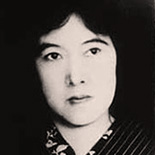 Akiko Yosano, (December 7, 1878 – May 29, 1942) was the pen-name of a Japanese author, poet, pioneering feminist, pacifist, and social reformer, active in the late Meiji period as well as the Taishō and early Shōwa periods of Japan. Her name at birth was Shō Hō. She is one of the most famous, and most controversial, post-classical woman poets of Japan.
Akiko Yosano, (December 7, 1878 – May 29, 1942) was the pen-name of a Japanese author, poet, pioneering feminist, pacifist, and social reformer, active in the late Meiji period as well as the Taishō and early Shōwa periods of Japan. Her name at birth was Shō Hō. She is one of the most famous, and most controversial, post-classical woman poets of Japan.
When Akiko was sixteen, she read Manyoshu, a collection of ancient Japanese poetry from the 8th century. It had a great impact on her and she started to write Tanka poetry. She joined a poetry circle, Sakai shikishima kai, in Osaka, and published her works in Yoshiashigusa, a poetry journal. She gradually began to gain a good reputation. Through her literary activities, Akiko became acquainted with such poets as Yamakawa Tomiko and Yosano Tekkan. Akiko admired Tekkan and respected him as her mentor. Tekkan was the editor of a newly created magazine, Myojo, and Akiko started to contribute to it. Her respect for Tekkan started to change into love. Tekkan had a common law wife and a child at that time, but Akiko did not hesitate to show her love. Recollecting her passionate feelings for him, she later writes in her “My Conception of Chastity”: “By an unexpected chance, I came to know a certain man and my sexual feelings underwent a violent change to a strange degree. For the first time I experienced the emotion of a real love that burned my body” (Beichman 108). Akiko left home to be with Tekkan and married him in 1902.
Midaregami (Tangled Hair) is her first collection of Tanka. It contains 399 poems, among which 385 are love poems expressing her feelings toward Tekkan.
From the introduction to Selected Tanka from Midaregami, translators Sanford Goldstein and Seishi Shinoda write: The connotations behind the term midaregami (tangled hair, disheveled hair) should be clarified. The word midaregami ought not to be viewed as the slovenly or unaesthetic appearance of a woman’s hair. Today, when Japanese are favoring more direct expression, evocative values of earlier terminology are lost to most of the younger generation. Modern Japanese males who are used to seeing women who have had their hair set at beauty parlors may visualize midaregami as an attribute of ugliness or carelessness. However, in the days before. World War 1, the image of a woman with even slightly disordered hair had a peculiar aesthetic and erotic association. H. H. Honda, in his small volume The Poetry of Yosano Akiko, translates midaregami as “Hair in Sweet Disorder.”
~~~~~~~~~~~~~~~~~~~~~~~~~~
A thousand lines
Of black black hair
All tangles, tangles —
And tangles too
My thoughts of love!
~~~~~~~~~~~~~~~~~~~~~~~~~~
Amidst the notes
Of my koto is another
Deep mysterious one,
A sound that comes from
Within my own breast.
~~~~~~~~~~~~~~~~~~~~~~~~~~
Each string and bridge of my koto
Makes me sad;
Spring is passing,
And yet how long my long long hair
In this flickering light!
~~~~~~~~~~~~~~~~~~~~~~~~~~
Early evening moon
Over the flowering field,
I felt somehow
He was waiting for me
And I came.
~~~~~~~~~~~~~~~~~~~~~~~~~~
Fragrant the lilies
In this room of love;
Hair unbound,
I fear
The pink of night’s passing.
~~~~~~~~~~~~~~~~~~~~~~~~~~
How lonely
By the temple bell
After I slipped out
To meet him
When the fog cleared.
~~~~~~~~~~~~~~~~~~~~~~~~~~
In my bath —
Submerged like some graceful lily
At the bottom of a spring,
How beautiful
This body of twenty summers.
~~~~~~~~~~~~~~~~~~~~~~~~~~
My black hair tangled
As my own tangled thoughts,
I lie here alone,
Dreaming of one who has gone,
Who stroked my hair till it shone.
~~~~~~~~~~~~~~~~~~~~~~~~~~
Only
A filament of cloud
Above,
But like some sacred song
It showed me the way.
~~~~~~~~~~~~~~~~~~~~~~~~~~
Picking wild roses,
Some to hold,
Some to put in my hair,
I wait for you in the fields
This long long day.
~~~~~~~~~~~~~~~~~~~~~~~~~~
(see another translation below)
passion ache of love,
Press my breasts,
Part the veil of mystery,
A flower blooms there,
Crimson and fragrant.
~~~~~~~~~~~~~~~~~~~~~~~~~~
(translated by Janine Beichman, see another translation above)
Pressing my breasts
I softly kick aside
the curtain of mystery
How deep the crimson
of the flower here
~~~~~~~~~~~~~~~~~~~~~~~~~~
Selling irises,
That girl
Leans against the door…
How sweet the scent of morning mist
About her hair!
~~~~~~~~~~~~~~~~~~~~~~~~~~
Spring is short!
Nothing endures!
I cried,
Letting him touch
These supple breasts!
~~~~~~~~~~~~~~~~~~~~~~~~~~
Still yearning
After the good,
The true, the beautiful?
O, my love, this flower in my hand
Is dazzling red!
~~~~~~~~~~~~~~~~~~~~~~~~~~
Sweet and sad
like love overwhelmed
with long sighs,
out of the depths of the willow
little by little
the moon appears.
~~~~~~~~~~~~~~~~~~~~~~~~~~
Tears in his eyes,
He heard my poem
And went away…
Is it ten long days
Since then?
~~~~~~~~~~~~~~~~~~~~~~~~~~
The clear spring inside me
Overflowed,
Became muddy —
A child of sin you are
And so am I.
~~~~~~~~~~~~~~~~~~~~~~~~~~
These scraps of paper
Scribbled with poems
I which I cursed and raved,
I press down hard
On a black butterfly
~~~~~~~~~~~~~~~~~~~~~~~~~~
This autumn will end.
Nothing can last forever.
Fate controls our lives.
Fondle my living breasts
With your strong hands.
~~~~~~~~~~~~~~~~~~~~~~~~~~
To punish
Men for their endless sins,
God gave me
This fair skin,
This long black hair!
~~~~~~~~~~~~~~~~~~~~~~~~~~
Weren’t
The many poems of love
We exchanged
By candlelight last night
Too wordy?
~~~~~~~~~~~~~~~~~~~~~~~~~~
When he saw me,
Were they, I wonder,
Bitter or sweet?
~~~~~~~~~~~~~~~~~~~~~~~~~~
Whispering goodnight
This spring evening
And leaving the room,
I take from the rack
His kimono and try it on.
~~~~~~~~~~~~~~~~~~~~~~~~~~
With this slender arm
Cradling
My sick lover,
I will kiss
His feverish mouth!